| Srl | Item |
| 1 |
ID:
124768
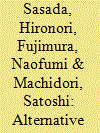

|
|
|
|
|
| Publication |
2013.
|
| Summary/Abstract |
Although party polarization is one of the most significant focal points in the study of contemporary US politics, a limited number of studies have examined its theoretical implications for other countries. In addition, a great deal of effort has been made in the study of the changes in voting bases (i.e., constituencies or interest groups). However, little attention has been given to the features of party organization. In this study we look at the process of polarization between two major parties in Japan in recent years and analyze the way Japanese parties took an alternative path to polarization. We argue that party polarization can be caused by the strategic position-taking of the party executive in addition to the centralization of the party organization.
|
|
|
|
|
|
|
|
|
|
|
|
|
|
|
|
| 2 |
ID:
156839
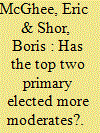

|
|
|
|
|
| Summary/Abstract |
Party polarization is perhaps the most significant political trend of the past several decades of American politics. Many observers have pinned hopes on institutional reforms to reinvigorate the political center. The Top Two primary is one of the most interesting and closely-watched of these reforms: a radically open primary system that removes much of the formal role for parties in the primary election and even allows for two candidates of the same party to face each other in the fall. Here we leverage the adoption of the Top Two in California and Washington to explore the reform’s effects on legislator behavior. We find an inconsistent effect since the reform was adopted in these two states. The evidence for post-reform moderation is stronger in California than in Washington, but some of this stronger effect appears to stem from a contemporaneous policy change—district lines drawn by an independent redistricting commission—while still more might have emerged from a change in term limits that was also adopted at the same time. The results validate some claims made by reformers, but question others, and their magnitude casts some doubt on the potential for institutions to reverse the polarization trend.
|
|
|
|
|
|
|
|
|
|
|
|
|
|
|
|
| 3 |
ID:
165500
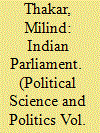

|
|
|
| 4 |
ID:
185542
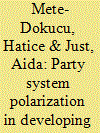

|
|
|
|
|
| Summary/Abstract |
This paper examines party system polarization over 19 general elections in Turkey from1950 to 2018. Using data on party policies from the Comparative Manifesto Project (CMP), we show that, contrary to the common view, party system polarization is not a persistent feature of Turkish politics. We also find that party system polarization on the left-right continuum reflects party differences primarily on social rather than economic or European integration issues. Finally, our results demonstrate that the military interventions in 1960 and 1980 reduced party system polarization in subsequent elections, even when controlling for other determinants of polarization. These findings have important implications for debates on party politics, military rule, and the prospects of democratic governance in developing democracies.
|
|
|
|
|
|
|
|
|
|
|
|
|
|
|
|
| 5 |
ID:
175113
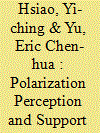

|
|
|
|
|
| Summary/Abstract |
Recently, the decline in support for democracy in consolidated democracies has gained substantial attention and provoked a heated scholarly debate (Foa and Mounk, 2016). As multiple reasons may contribute to explaining why citizens have lost faith in democratic systems, this article focuses on the linkage between political polarization and democratic support at the mass level. By using data from a recent survey conducted in Taiwan, we first construct two measures of party polarization—namely, the affective polarization score and perceived issue polarization score. While the former can be regarded as an identity-based polarization measure, the latter is a policy-based measure. Then, we explore the associations between the two polarization measures and various attitudes toward democracy. Our empirical findings suggest that Taiwanese people who have more diverse affects toward the two major parties are more likely to make a negative assessment of Taiwan’s current and future democracy and be less supportive of the democratic system. However, people who perceive a greater issue polarization between the two major parties do not necessarily have more positive or negative attitudes toward democracy. As an implication for future democratic development, this analysis suggests that affective party polarization may be harmful to the health of democracy.
|
|
|
|
|
|
|
|
|
|
|
|
|
|
|
|
| 6 |
ID:
151254
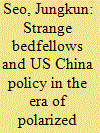

|
|
|
|
|
| Summary/Abstract |
Party polarization is the new buzzword in American politics and yet partisanship seems to play such a small role in determining congressional votes on China policy. We still do not know much about how polarized politics in Washington actually exerts influence in the making of U.S. policy toward Beijing. Paying special attention to America`s response to China from 2001 through 2012, this article seeks to analyze the sources and processes of how party polarization affects foreign policymaking. I argue that with the U.S. president adopting a hands-off approach and parties being polarized, a coalition of ideologically extreme lawmakers is likely to take cross-partisan actions over China. In essence, individual rank-and-file lawmakers tend to step forward and speak out in a party-less manner in the era of polarized America and a rising China.
|
|
|
|
|
|
|
|
|
|
|
|
|
|
|
|